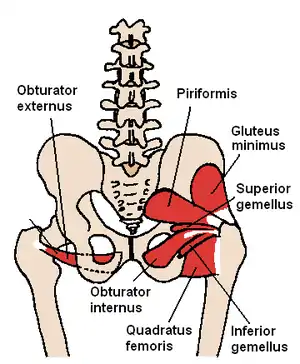Piriformis nerve
The piriformis nerve, also known as the nerve to piriformis, is the peripheral nerve that innervates the piriformis muscle.
| Piriformis nerve | |
|---|---|
 Diagram of sacral plexus and pudendal plexus. (Label "to piriformis" is at center left.) | |
 The piriformis and nearby muscles | |
| Details | |
| From | sacral plexus (S1–S2) |
| Innervates | piriformis muscle |
| Identifiers | |
| Latin | Nervus musculi piriformis |
| TA98 | A14.2.07.029 |
| TA2 | 6545 |
| FMA | 16509 |
| Anatomical terms of neuroanatomy | |
Structure
The piriformis nerve to piriformis originates from the ventral rami of S1 and S2 in the sacral plexus.[1][2] It enters the anterior surface of the piriformis muscle. This nerve may be double. This nerve is not to be confused with the inferior gluteal nerve, which also arises from posterior divisions of the first and second sacral ventral rami (L5, S1, S2).
Function
The piriformis nerve innervates the piriformis muscle.[1]
See also
References
![]() This article incorporates text in the public domain from page 957 of the 20th edition of Gray's Anatomy (1918)
This article incorporates text in the public domain from page 957 of the 20th edition of Gray's Anatomy (1918)
- Pan, Jason; Vasudevan, John (2018-01-01), Freedman, Mitchell K.; Gehret, Jeffrey A.; Young, George W.; Kamen, Leonard B. (eds.), "Chapter 24 - Piriformis Syndrome: A Review of the Evidence and Proposed New Criteria for Diagnosis", Challenging Neuropathic Pain Syndromes, Elsevier, pp. 205–215, ISBN 978-0-323-48566-1, retrieved 2021-02-03
- Khan, Dost; Nelson, Ariana (2018). "67 - Piriformis Syndrome". Essentials of Pain Medicine. Elsevier. pp. 613–618. doi:10.1016/B978-0-323-40196-8.00067-X. ISBN 978-0-323-40196-8.
홍재기
This article is issued from Wikipedia. The text is licensed under Creative Commons - Attribution - Sharealike. Additional terms may apply for the media files.